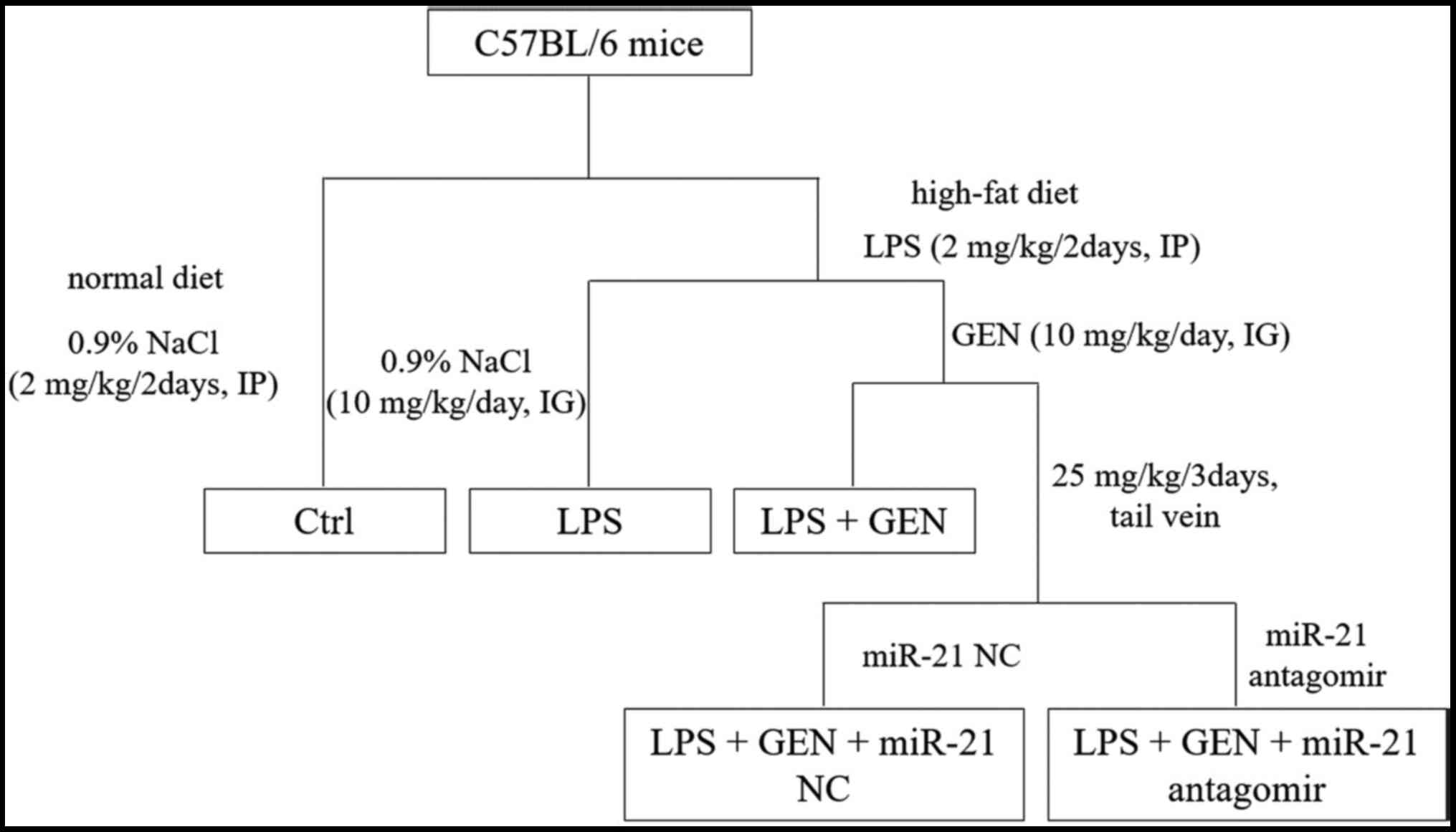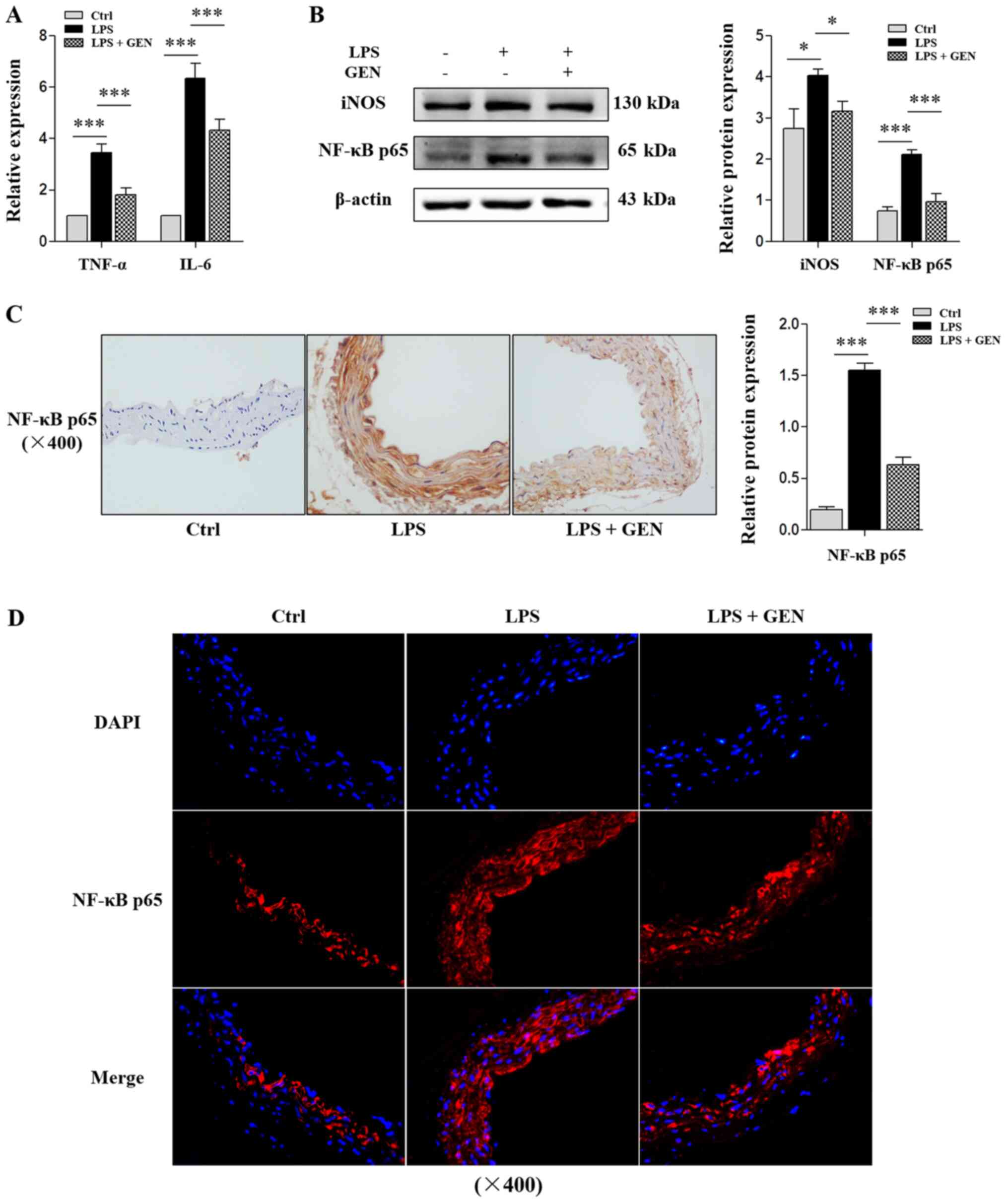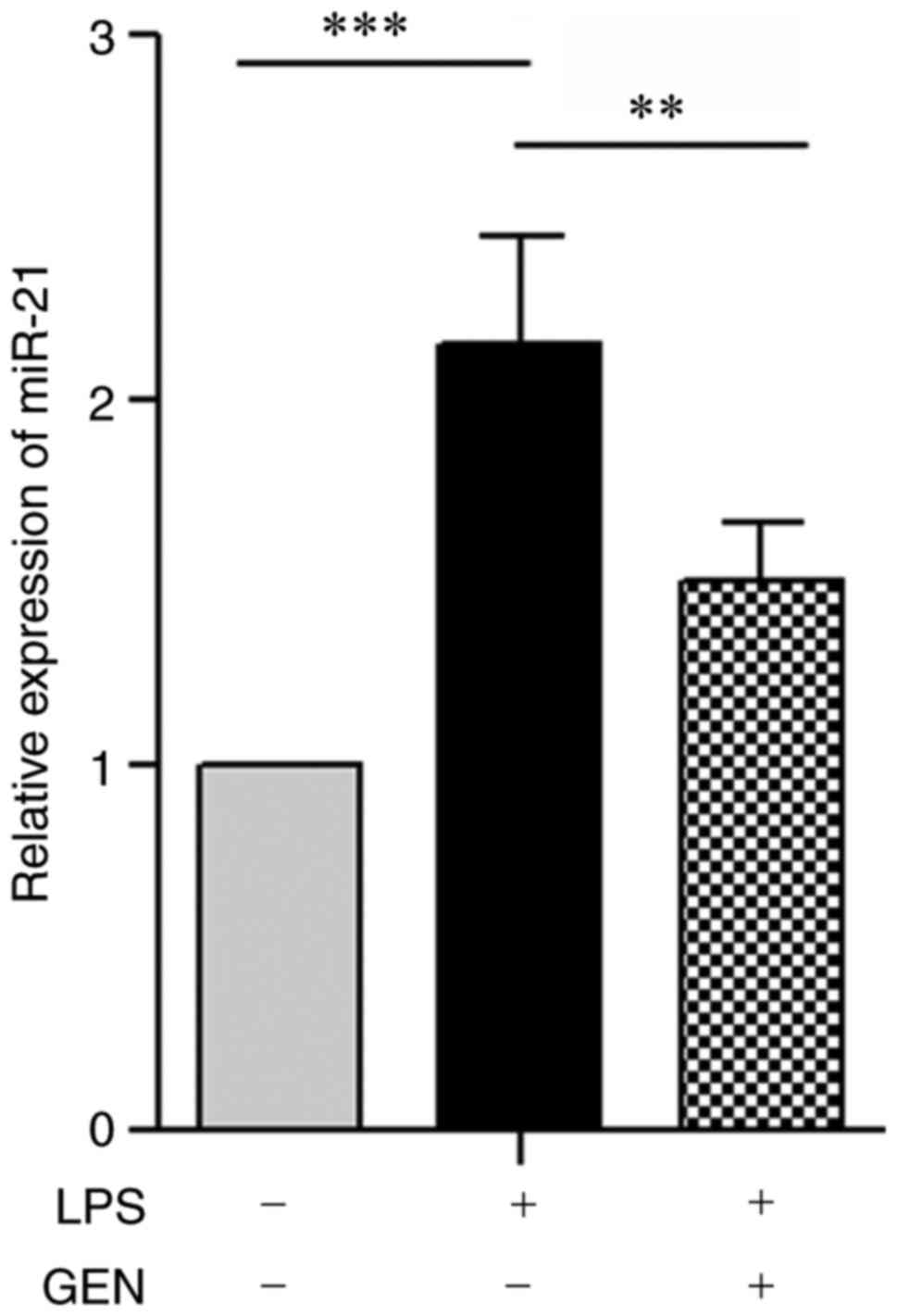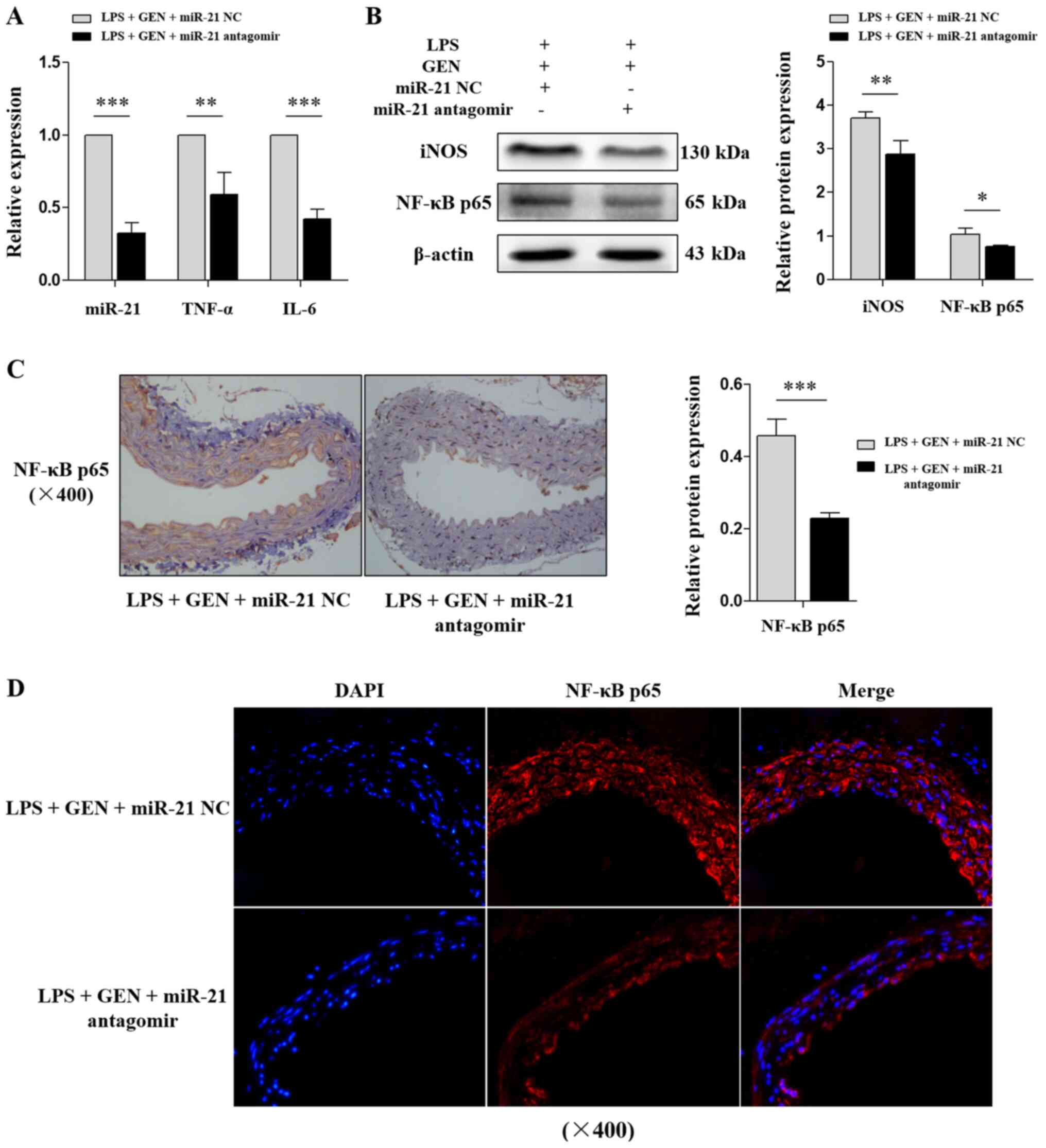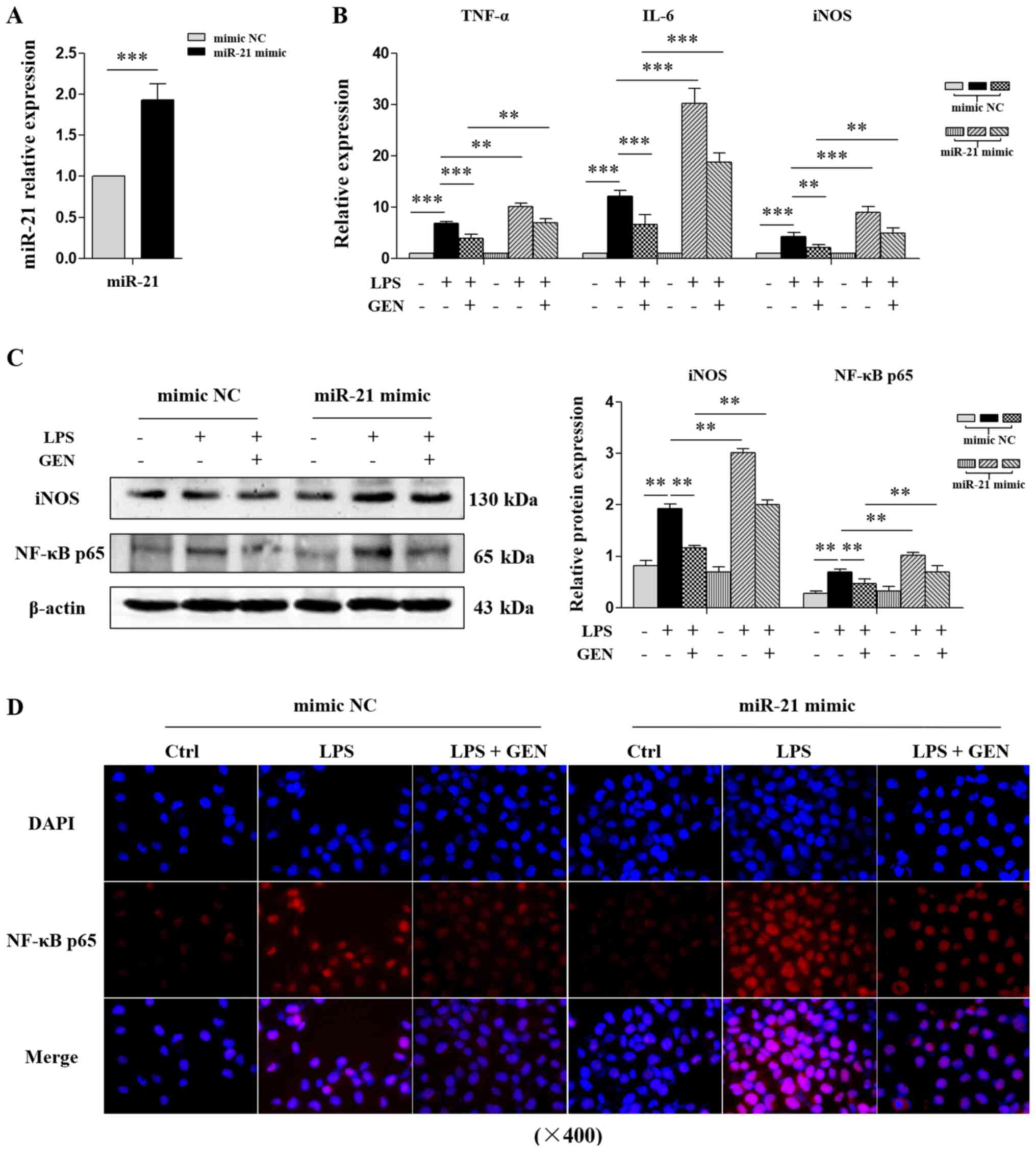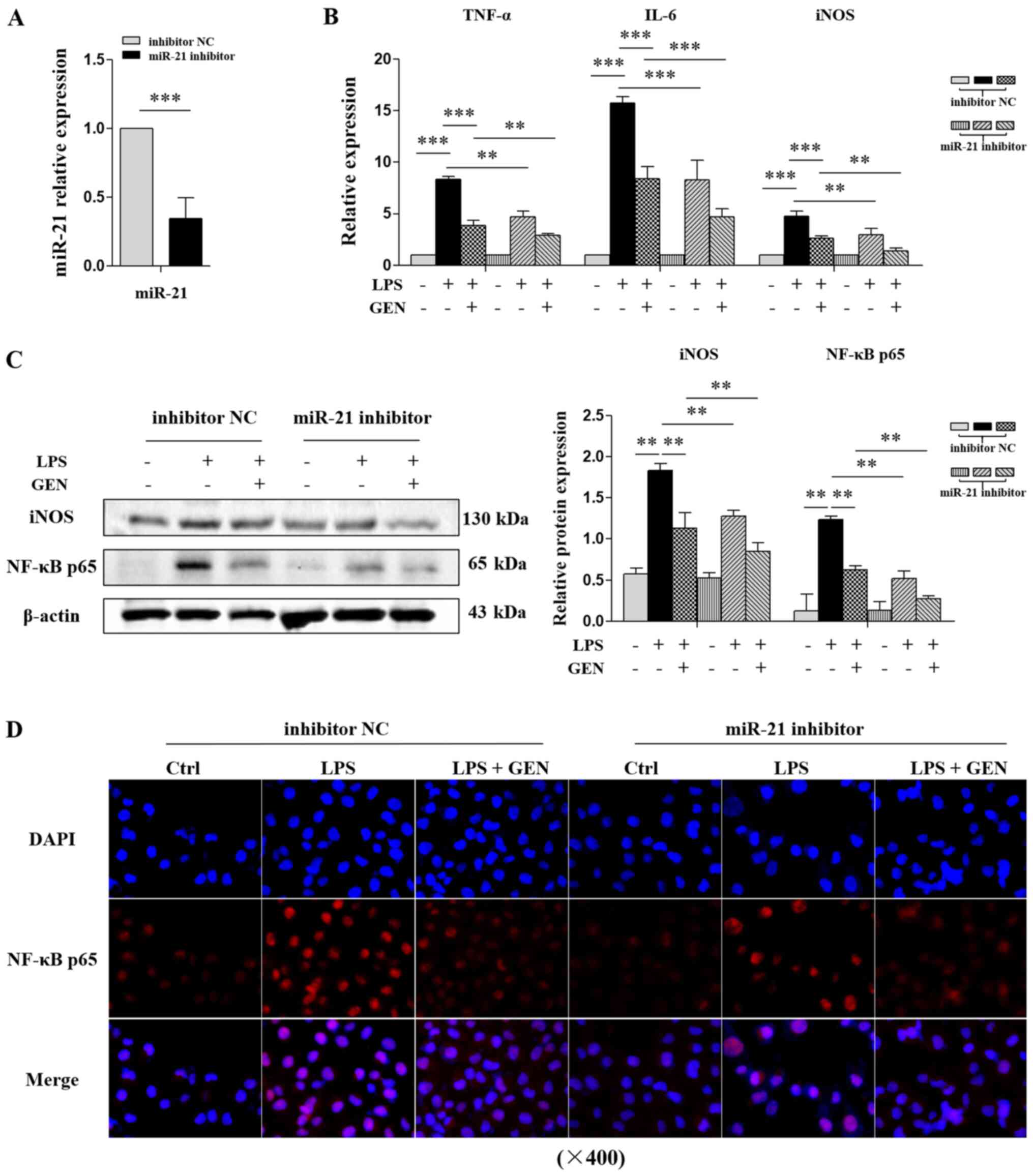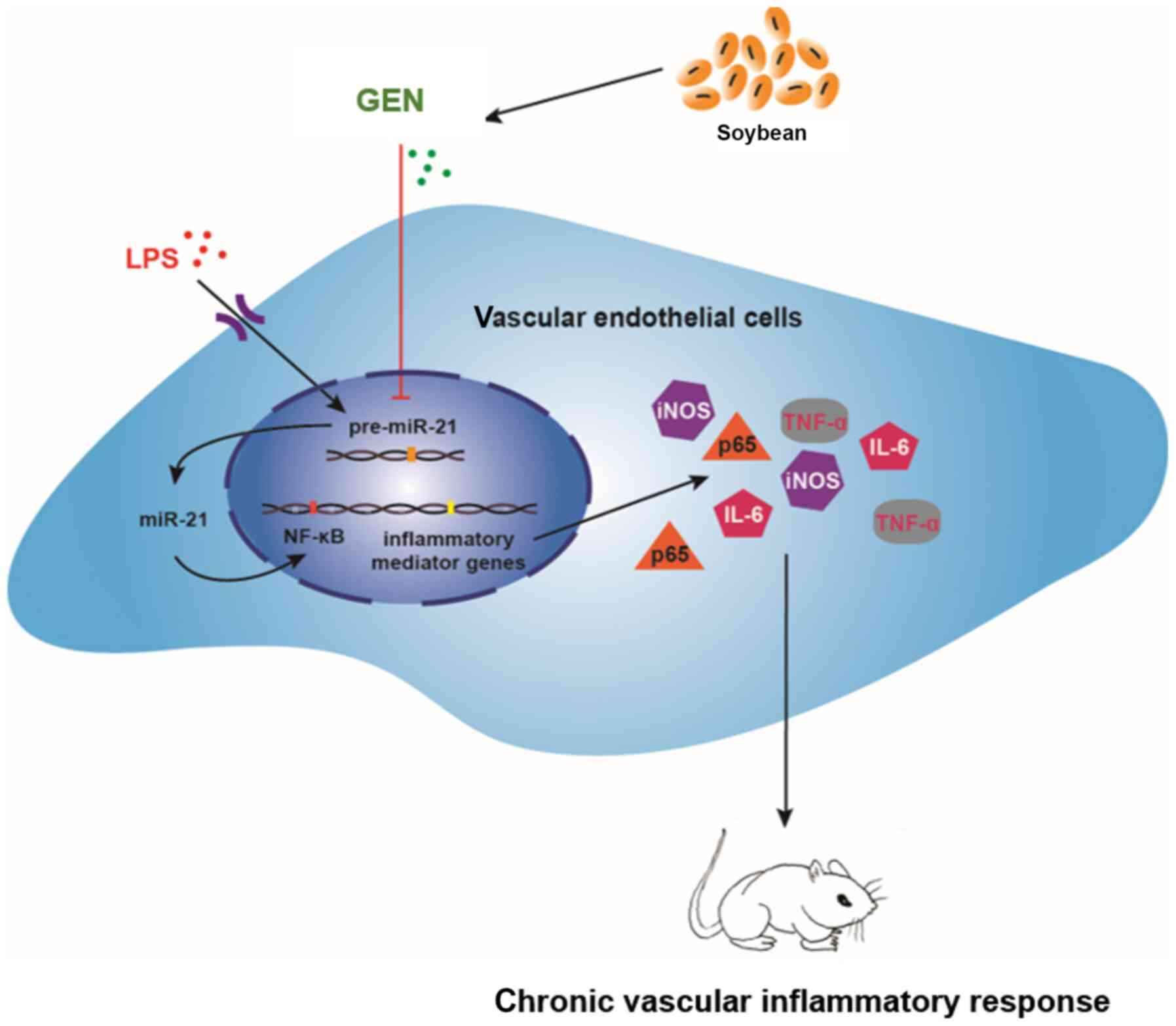|
1
|
Libby P and Hansson GK: Inflammation and
immunity in diseases of the arterial tree: Players and layers. Circ
Res. 116:307–311. 2015. View Article : Google Scholar : PubMed/NCBI
|
|
2
|
Gimbrone MA Jr and García-Cardeña G:
Endothelial cell dysfunction and the pathobiology of
atherosclerosis. Circ Res. 118:620–636. 2016. View Article : Google Scholar : PubMed/NCBI
|
|
3
|
Ross R: Atherosclerosis-an inflammatory
disease. N Engl J Med. 340:115–126. 1999. View Article : Google Scholar : PubMed/NCBI
|
|
4
|
Bacchi S, Palumbo P, Sponta A and
Coppolino MF: Clinical pharmacology of non-steroidal
anti-inflammatory drugs: A review. Antiinflamm Antiallergy Agents
Med Chem. 11:52–64. 2012. View Article : Google Scholar : PubMed/NCBI
|
|
5
|
LiverTox: Clinical and research
information on drug-induced liver injury (Internet). Bethesda (MD)
National Institute of Diabetes and Digestive and Kidney Diseases.
316431762012.
|
|
6
|
Harirforoosh S, Asghar W and Jamali F:
Adverse effects of nonsteroidal antiinflammatory drugs: An update
of gastrointestinal, cardiovascular and renal complications. J
Pharm Pharm Sci. 16:821–847. 2013. View
Article : Google Scholar : PubMed/NCBI
|
|
7
|
Sutrisno S, Aprina H, Simanungkalit HM,
Andriyani A, Barlianto W, Sujuti H, Santoso S, Dwijayasa PM,
Wahyuni ES and Mustofa E: Genistein modulates the estrogen receptor
and suppresses angiogenesis and inflammation in the murine model of
peritoneal endometriosis. J Tradit Complement Med. 8:278–281. 2017.
View Article : Google Scholar : PubMed/NCBI
|
|
8
|
Arakawa S, Inoue M, Kinouchi R, Morizumi
S, Yamaguchi M, Shimazu Y and Takeda M: Dietary constituent
genistein inhibits the hyperexcitability of trigeminal nociceptive
neurons associated with mechanical hyperalgesia following orofacial
inflammation. J Oral Biosci. 61:215–220. 2019. View Article : Google Scholar : PubMed/NCBI
|
|
9
|
Jaiswal N, Akhtar J, Singh SP, Badruddeen
and Ahsan F: An overview on genistein and its various formulations.
Drug Res (Stuttg). 69:305–313. 2019. View Article : Google Scholar : PubMed/NCBI
|
|
10
|
Liu B, Xu L, Yu X, Jiao X, Yan J, Li W and
Guo M: Genistein inhibited estradiol-induced vascular endothelial
cell injury by downregulating the FAK/Focal adhesion pathway. Cell
Physiol Biochem. 49:2277–2292. 2018. View Article : Google Scholar : PubMed/NCBI
|
|
11
|
Han S, Wu H, Li W and Gao P: Protective
effects of genistein in homocysteine-induced endothelial cell
inflammatory injury. Mol Cell Biochem. 403:43–49. 2015. View Article : Google Scholar : PubMed/NCBI
|
|
12
|
Deretic V and Levine B: Autophagy balances
inflammation in innate immunity. Autophagy. 14:243–251. 2018.
View Article : Google Scholar : PubMed/NCBI
|
|
13
|
Deretic V and Klionsky DJ: Autophagy and
inflammation: A special review issue. Autophagy. 14:179–180. 2018.
View Article : Google Scholar : PubMed/NCBI
|
|
14
|
Zhang H, Yang X, Pang X, Zhao Z, Yu H and
Zhou H: Genistein protects against ox-LDL-induced senescence
through enhancing SIRT1/LKB1/AMPK-mediated autophagy flux in
HUVECs. Mol Cell Biochem. 455:127–134. 2019. View Article : Google Scholar : PubMed/NCBI
|
|
15
|
Zhang H, Zhao Z, Pang X, Yang J, Yu H,
Zhang Y, Zhou H and Zhao J: miR-34a/sirtuin-1/foxo3a is involved in
genistein protecting against ox-LDL-induced oxidative damage in
HUVECs. Toxicol Lett. 277:115–122. 2017. View Article : Google Scholar : PubMed/NCBI
|
|
16
|
Yi L, Chang M, Zhao Q, Zhou Z, Huang X,
Guo F and Huan J: Genistein-3′-sodium sulphonate protects against
lipopolysaccharide-induced lung vascular endothelial cell apoptosis
and acute lung injury via BCL-2 signalling. J Cell Mol Med.
24:1022–1035. 2020. View Article : Google Scholar : PubMed/NCBI
|
|
17
|
Hajibabaie F, Kouhpayeh S, Mirian M,
Rahimmanesh I, Boshtam M, Sadeghian L, Gheibi A, Khanahmad H and
Shariati L: MicroRNAs as the actors in the atherosclerosis
scenario. J Physiol Biochem. 76:1–12. 2020. View Article : Google Scholar : PubMed/NCBI
|
|
18
|
Li J, Li K and Chen X:
Inflammation-regulatory microRNAs: Valuable targets for
intracranial atherosclerosis. J Neurosci Res. 97:1242–1252. 2019.
View Article : Google Scholar : PubMed/NCBI
|
|
19
|
Tao L, Xu X, Fang Y, Wang A, Zhou F, Shen
Y and Li J: miR-21 targets jnk and ccr7 to modulate the
inflammatory response of grass carp following bacterial infection.
Fish Shellfish Immunol. 94:258–263. 2019. View Article : Google Scholar : PubMed/NCBI
|
|
20
|
Shoeibi S: Diagnostic and theranostic
microRNAs in the pathogenesis of atherosclerosis. Acta Physiol
(Oxf). 228:e133532020. View Article : Google Scholar : PubMed/NCBI
|
|
21
|
Sessa R, Seano G, di Blasio L, Gagliardi
PA, Isella C, Medico E, Cotelli F, Bussolino F and Primo L: The
miR-126 regulates angiopoietin-1 signaling and vessel maturation by
targeting p85β. Biochim Biophys Acta. 1823:1925–1935. 2012.
View Article : Google Scholar : PubMed/NCBI
|
|
22
|
Muramatsu F, Kidoya H, Naito H, Sakimoto S
and Takakura N: MicroRNA-125b inhibits tube formation of blood
vessels through translational suppression of VE-cadherin. Oncogene.
32:414–421. 2013. View Article : Google Scholar : PubMed/NCBI
|
|
23
|
Zhang Y, Liu D, Chen X, Li J, Li L, Bian
Z, Sun F, Lu J, Yin Y, Cai X, et al: Secreted monocytic miR-150
enhances targeted endothelial cell migration. Mol Cell. 39:133–144.
2010. View Article : Google Scholar : PubMed/NCBI
|
|
24
|
Pordzik J, Pisarz K, De Rosa S, Jones AD,
Eyileten C, Indolfi C, Malek L and Postula M: The potential role of
platelet-related microRNAs in the development of cardiovascular
events in high-risk populations, including diabetic patients: A
review. Front Endocrinol (Lausanne). 9:742018. View Article : Google Scholar : PubMed/NCBI
|
|
25
|
Canfran-Duque A, Rotllan N, Zhang X,
Fernandez-Fuertes M, Ramirez-Hidalgo C, Araldi E, Daimiel L, Busto
R, Fernandez-Hernando C and Suárez Y: Macrophage deficiency of
miR-21 promotes apoptosis, plaque necrosis, and vascular
inflammation during atherogenesis. EMBO Mol Med. 9:1244–1262. 2017.
View Article : Google Scholar : PubMed/NCBI
|
|
26
|
Chipont A, Esposito B, Challier I,
Montabord M, Tedgui A, Mallat Z, Loyer X and Potteaux S:
MicroRNA-21 deficiency alters the survival of Ly-6Clo
monocytes in ApoE−/− mice and reduces early-stage
atherosclerosis-brief report. Arterioscler Thromb Vasc Biol.
39:170–177. 2019. View Article : Google Scholar : PubMed/NCBI
|
|
27
|
Huang X, Yue Z, Wu J, Chen J, Wwang S, Wu
J, Ren L, Zhang A, Deng P, Wang K, et al: MicroRNA-21 knockout
exacerbates angiotensin II-induced thoracic aortic aneurysm and
dissection in mice with abnormal transforming growth factor-β-SMAD3
signaling. Arterioscler Thromb Vasc Biol. 38:1086–1101. 2018.
View Article : Google Scholar : PubMed/NCBI
|
|
28
|
Li K, Cui MZ, Zhang KW, Wang GQ and Zhai
ST: Effect of miR-21 on rat thoracic aortic aneurysm model by
regulating the expressions of MMP-2 and MMP-9. Eur Rev Med
Pharmacol Sci. 24:878–884. 2020.PubMed/NCBI
|
|
29
|
Cong L, Yang S, Zhang Y, Cao J and Fu X:
DFMG attenuates the activation of macrophages induced by coculture
with LPC-injured HUVE12 cells via the TLR4/MyD88/NFKB signaling
pathway. Int J Mol Med. 41:2619–2628. 2018.PubMed/NCBI
|
|
30
|
Cong L, Zhang Y, Huang H, Cao J and Fu X:
DFMG reverses proliferation and migration of vascular smooth muscle
cells induced by co-culture with injured vascular endothelial cells
via suppression of the TLR4-mediated signaling pathway. Mol Med
Rep. 17:5692–5699. 2018.PubMed/NCBI
|
|
31
|
Xiang X, Li L, Bo P, Kuang T, Liu S, Xie
X, Guo S, Fu X and Zhang Y: 7-Difluoromethyl-5,4′dimethoxygenistein
exerts antiangiogenic effects on acute promyelocytic leukemia HL-60
cells by inhibiting the TLR4/NF-κB signaling pathway. Mol Med Rep.
21:2251–2259. 2020.PubMed/NCBI
|
|
32
|
Lee WR, Kim KH, An HJ, Park YY, Kim KS,
Lee CK, Min BK and Park KK: Effects of chimeric decoy
oligodeoxynucleotide in the regulation of transcription factors
NF-κB and Sp1 in an animal model of atherosclerosis. Basic Clin
Pharmacol Toxicol. 112:236–243. 2013. View Article : Google Scholar : PubMed/NCBI
|
|
33
|
Kim SJ, Park JH, Kim KH, Lee WR, Kim KS
and Park KK: Melittin inhibits atherosclerosis in LPS/high-fat
treated mice through atheroprotective actions. J Atheroscler
Thromb. 18:1117–1126. 2011. View Article : Google Scholar : PubMed/NCBI
|
|
34
|
Kim SJ, Park JH, Kim KH, Lee WR, Lee S,
Kwon OC, Kim KS and Park KK: Effect of NF-κB decoy
oligodeoxynucleotide on LPS/high-fat diet-induced atherosclerosis
in an animal model. Basic Clin Pharmacol Toxicol. 107:925–930.
2010. View Article : Google Scholar : PubMed/NCBI
|
|
35
|
Livak KJ and Schmittgen TD: Analysis of
relative gene expression data using real-time quantitative PCR and
the 2(-Delta Delta C(T)) method. Methods. 25:402–408. 2001.
View Article : Google Scholar : PubMed/NCBI
|
|
36
|
Liu J, Wang X, Zheng M and Luan Q:
Lipopolysaccharide from Porphyromonas gingivalis promotes autophagy
of human gingival fibroblasts through the PI3K/Akt/mTOR signaling
pathway. Life Sci. 211:133–139. 2018. View Article : Google Scholar : PubMed/NCBI
|
|
37
|
Khedoe PPSJ, de Kleijn S, van
Oeveren-Rietdijk AM, Plomp JJ, de Boer HC, van Pel M, Rensen PCN,
Berbee JFP and Hiemstra PS: Acute and chronic effects of treatment
with mesenchymal stromal cells on LPS-induced pulmonary
inflammation, emphysema and atherosclerosis development. PLoS One.
12:e01837412017. View Article : Google Scholar : PubMed/NCBI
|
|
38
|
Sheane BJ, Smyth P, Scott K, Aziz R,
Buckley M, Lodge E, Kiely N, Kingston M, McGovern E, Healy M, et
al: An association between microRNA-21 expression and vitamin D
deficiency in coronary artery disease. Microrna. 4:57–63. 2015.
View Article : Google Scholar : PubMed/NCBI
|
|
39
|
Nejad C, Pepin G, Behlke MA and Gantier
MP: Modified polyadenylation-based RT-qPCR increases selectivity of
amplification of 3′-MicroRNA isoforms. Front Genet. 9:112018.
View Article : Google Scholar : PubMed/NCBI
|
|
40
|
Krützfeldt J, Rajewsky N, Braich R, Rajeev
KG, Tuschl T, Manoharan M and Stoffel M: Silencing of microRNAs in
vivo with ‘antagomirs’. Nature. 438:685–689. 2005. View Article : Google Scholar : PubMed/NCBI
|
|
41
|
Hermkens DMA, Stam OCG, de Wit NM, Fontijn
RD, Jongejan A, Moerland PD, Mackaaij C, Waas ISE, Daemen MJAP and
de Vries HE: Profiling the unique protective properties of
intracranial arterial endothelial cells. Acta Neuropathol Commun.
7:1512019. View Article : Google Scholar : PubMed/NCBI
|
|
42
|
Zeng Y, Xu J, Hua YQ, Peng Y and Xu XL:
MDM2 contributes to oxidized low-density lipoprotein-induced
inflammation through modulation of mitochondrial damage in
endothelial cells. Atherosclerosis. 305:1–9. 2020. View Article : Google Scholar : PubMed/NCBI
|
|
43
|
Virani SS, Alonso A, Benjamin EJ,
Bittencourt MS, Callaway CW, Carson AP, Chamberlain AM, Chang AR,
Cheng S, Delling FN, et al: Heart disease and stroke
statistics-2020 update: A report from the American heart
association. Circulation. 141:e139–e596. 2020. View Article : Google Scholar : PubMed/NCBI
|
|
44
|
Varela ML, Mogildea M, Moreno I and Lopes
A: Acute inflammation and metabolism. Inflammation. 41:1115–1127.
2018. View Article : Google Scholar : PubMed/NCBI
|
|
45
|
Aghasafari P, George U and Pidaparti R: A
review of inflammatory mechanism in airway diseases. Inflamm Res.
68:59–74. 2019. View Article : Google Scholar : PubMed/NCBI
|
|
46
|
Skaper SD, Facci L, Zusso M and Giusti P:
An inflammation-centric view of neurological disease: Beyond the
neuron. Front Cell Neurosci. 12:722018. View Article : Google Scholar : PubMed/NCBI
|
|
47
|
Tan H, Zhao J, Zhang H, Zhai Q and Chen W:
Novel strains of Bacteroides fragilis and Bacteroides ovatus
alleviate the LPS-induced inflammation in mice. Appl Microbiol
Biotechnol. 103:2353–2365. 2019. View Article : Google Scholar : PubMed/NCBI
|
|
48
|
Wu X, Zhang LL, Yin LB, Fu YJ, Jiang YJ,
Ding HB, Chu ZX, Shang H and Zhang ZN: Deregulated microRNA-21
expression in monocytes from HIV-infected patients contributes to
elevated IP-10 secretion in HIV infection. Front Immunol.
8:11222017. View Article : Google Scholar : PubMed/NCBI
|
|
49
|
Lu Y, An Y, Lv C, Ma W, Xi Y and Xiao R:
Dietary soybean isoflavones in Alzheimer's disease prevention. Asia
Pac J Clin Nutr. 27:946–954. 2018.PubMed/NCBI
|
|
50
|
Gholampour F, Mohammadi Z, Karimi Z and
Owji SM: Protective effect of genistein in a rat model of ischemic
acute kidney injury. Gene. 753:1447892020. View Article : Google Scholar : PubMed/NCBI
|
|
51
|
Das G, Paramithiotis S, Sundaram
Sivamaruthi B, Wijaya CH, Suharta S, Sanlier N, Shin HS and Patra
JK: Traditional fermented foods with anti-aging effect: A
concentric review. Food Res Int. 134:1092692020. View Article : Google Scholar : PubMed/NCBI
|
|
52
|
Petry FDS, Coelho BP, Gaelzer MM, Kreutz
F, Guma FTCR, Salbego CG and Trindade VMT: Genistein protects
against amyloid-beta-induced toxicity in SH-SY5Y cells by
regulation of Akt and Tau phosphorylation. Phytother Res.
34:796–807. 2020. View Article : Google Scholar : PubMed/NCBI
|
|
53
|
Ahmad Z, Ng CT, Fong LY, Bakar NA, Hussain
NH, Ang KP, Ee GC and Hakim MN: Cryptotanshinone inhibits
TNF-α-induced early atherogenic events in vitro. J Physiol Sci.
66:213–220. 2016. View Article : Google Scholar : PubMed/NCBI
|
|
54
|
Unver N and McAllister F: IL-6 family
cytokines: Key inflammatory mediators as biomarkers and potential
therapeutic targets. Cytokine Growth Factor Rev. 41:10–17. 2018.
View Article : Google Scholar : PubMed/NCBI
|
|
55
|
Richards J, El-Hamamsy I, Chen S, Sarang
Z, Sarathchandra P, Yacoub MH, Chester AH and Butcher JT:
Side-specific endothelial-dependent regulation of aortic valve
calcification: Interplay of hemodynamics and nitric oxide
signaling. Am J Pathol. 182:1922–1931. 2013. View Article : Google Scholar : PubMed/NCBI
|
|
56
|
Cassini-Vieira P, Araujo FA, da Costa Dias
FL, Russo RC, Andrade SP, Teixeira MM and Barcelos LS: iNOS
activity modulates inflammation, angiogenesis, and tissue fibrosis
in polyether-polyurethane synthetic implants. Mediators Inflamm.
2015:1384612015. View Article : Google Scholar : PubMed/NCBI
|
|
57
|
Bellucci A, Bubacco L, Longhena F,
Parrella E, Faustini G, Porrini V, Bono F, Missale C and Pizzi M:
Nuclear Factor-κB Dysregulation and α-synuclein pathology: Critical
interplay in the pathogenesis of Parkinson's disease. Front Aging
Neurosci. 12:682020. View Article : Google Scholar : PubMed/NCBI
|
|
58
|
Zhang Q, Lenardo MJ and Baltimore D: 30
Years of NF-κB: A blossoming of relevance to human pathobiology.
Cell. 168:37–57. 2017. View Article : Google Scholar : PubMed/NCBI
|
|
59
|
Skvortsova K, Iovino N and Bogdanovic O:
Functions and mechanisms of epigenetic inheritance in animals. Nat
Rev Mol Cell Biol. 19:774–790. 2018. View Article : Google Scholar : PubMed/NCBI
|
|
60
|
Hulshoff MS, Del Monte-Nieto G, Kovacic J
and Krenning G: Non-coding RNA in endothelial-to-mesenchymal
transition. Cardiovasc Res. 115:1716–1731. 2019. View Article : Google Scholar : PubMed/NCBI
|
|
61
|
Singh RP, Massachi I, Manickavel S, Singh
S, Rao NP, Hasan S, Mc Curdy DK, Sharma S, Wong D, Hahn BH and
Rehimi H: The role of miRNA in inflammation and autoimmunity.
Autoimmun Rev. 12:1160–1165. 2013. View Article : Google Scholar : PubMed/NCBI
|
|
62
|
Das A, Ganesh K, Khanna S, Sen CK and Roy
S: Engulfment of apoptotic cells by macrophages: A role of
microRNA-21 in the resolution of wound inflammation. J Immunol.
192:1120–1129. 2014. View Article : Google Scholar : PubMed/NCBI
|
|
63
|
Xue Z, Xi Q, Liu H, Guo X, Zhang J, Zhang
Z, Li Y, Yang G, Zhou D, Yang H, et al: miR-21 promotes NLRP3
inflammasome activation to mediate pyroptosis and endotoxic shock.
Cell Death Dis. 10:4612019. View Article : Google Scholar : PubMed/NCBI
|















